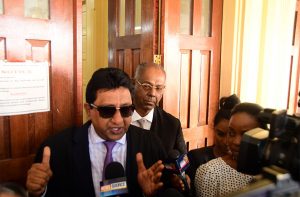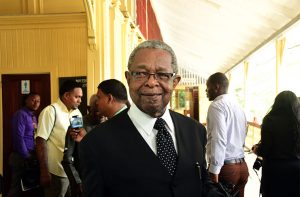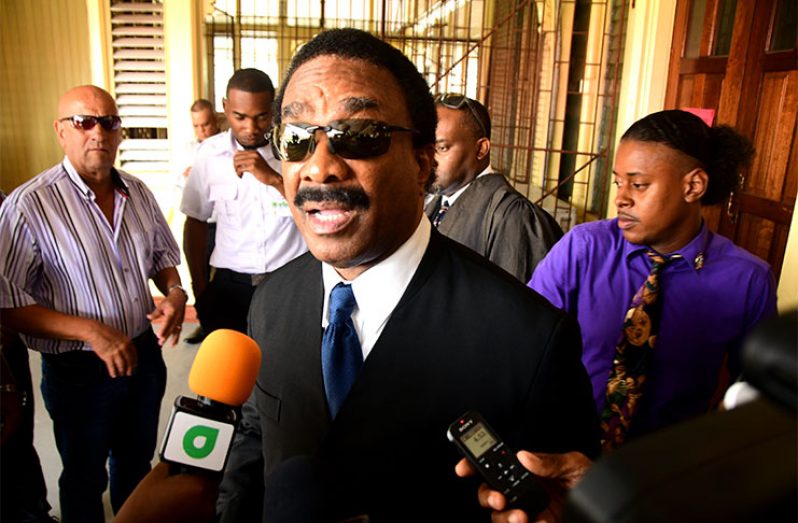…AG says CJ ruling vindicates his argument that matters could not be re-litigated
…challenge to no-residency requirement to be on OLE likely
DESCRIBING the judgment of the Chief Justice (ag) Roxane George-Wiltshire as “well-reasoned,” Attorney General and Minister of Legal Affairs Basil Williams, on Wednesday, said he was pleased with the decision of the High Court to uphold the Order that activated House-to-House Registration.
The Opposition, through Chartered Accountant Christopher Ram, had asked the court for several declarations aimed at blocking and invalidating the national registration exercise as well as compelling GECOM to hold elections on or before September 18, 2019. All these orders were denied. “All that the applicant asked for, the court refused just as in the case of the CCJ, and of course the court accepted that the matter was res judicata, they were re-litigating before her,” the Attorney General told reporters outside of the courtroom, shortly after the judgment was handed down.
However, he noted that the ruling made by the Chief Justice on the removal of persons from the National Register of Registrants, from which the Official List of Electors would be compiled, did not form part of the Application filed by Ram nor was it a declaration sought, and as such, the Government, through him, nor GECOM, had the opportunity to contest that specific element.

The Chief Justice, in handing down the decision, ruled that residency was not a requirement and as such Guyanese cannot be easily removed from the National Register of Registrants but Minister Williams differed on this position.
“The important thing about this is that overseas voting was abolished in Guyana, and that’s why the qualification of residency was an additional one that was facilitated under Article 159 (2) (c), which spoke about additional qualifications, could be arrived at by the passage of act of Parliament, and that’s why the National Registration Act and also the Representation of the People Act contain provision for residency,” the Attorney General explained.
He added: “residency is a very important aspect because that is the only way you can locate someone for voting.” Williams maintained that Article 159 (5) states that GECOM can compile a register as was done in 2008 when a new register was compiled as a result of House-to-House Registration. GECOM, he said, would have to decide whether it will appeal that section of the ruling that addresses the removal of persons from the list.
“But what is very important is that House-to-House Registration is not unconstitutional; no date was ever fixed by the CCJ and she (Chief Justice) wouldn’t fix a date either nor no election ought to be held within three months as they had contended and generally there was nothing that was asked for by the applicant that was successful,” the Attorney General summarised.
For his part, Roysdale Forde, the attorney that represented the Chief Elections Officer Keith Lowenfield in association with Senior Counsel Neil Boston, told reporters that the elections body would have to decide its next move. “Subject to further instructions, of my own opinion at this present time, I believe that there is a serious ground, a serious flaw in the decision to that extent and I would advise my client to appeal.
The issue was never raised as part of the pleadings in the document. You heard that the court dismissed every application filed,” Forde told reporters outside of the courtroom. GECOM’s Attorney, Senior Counsel Stanley Marcus also indicated that he will be guided by the Elections Commission’s decision.
Anil Nandlall, who represented Ram in association with Ralph Ramkarran, told reporters that his client would be appealing the decision of the High Court. “Obviously, we will appeal because we do not agree that no timeframe has been fixed,” Nandlall said.
In his submissions both oral and written Nandlall had urged the court to set a timeframe for the holding of elections, in keeping with the declarations and orders sought by his client, but the Chief Justice ruled that his application lacked supporting evidence.
But that aside, she ruled that the High Court, like the CCJ, cannot issue coercive orders instructing the President, the National Assembly and implicitly GECOM how they should act. But unhappy with the ruling, Nandlall told reporters that “it cannot be open-ended.”

“The CCJ judgment could not have meant that elections would never be held unless Parliament agrees. Suppose Parliament does not agree. There is always a timeframe implied. The constitution must be obeyed at its earliest convenience and in relation to that, respectfully I am not impressed with that aspect of the ruling and that certainly will excite the review of an appellate tribunal,” he lamented.
However, he was in high praise of other sections of the ruling which dealt with method of compiling the National Register of Registrants.
“The Court made it very clear that House-to-House Registration is not mandatory, and it is not the only option available to GECOM. The Court pointed out very clearly and emphatically that GECOM must now determine which one of the two courses of action it will choose having regard to the timeframes that are available,” he said.
According to him, the ball is now in GECOM’s court to determine how it will proceed.





.jpg)








